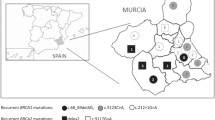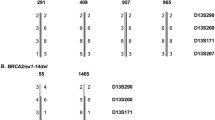Abstract
64 families with a history of male breast cancer aged 60 or less or with a family history of male and female breast cancer were screened for the presence of BRCA1 and BRCA2 mutations. Seventeen pathogenic BRCA2 and four BRCA1 mutations were identified (34%) in samples from an affected family member. All but one of the mutations segregated with disease where samples were available and pedigree structure permitted. Despite high sensitivity of mutation testing only 64% of families fulfilling BCLC criteria had an identifiable pathogenic mutation. It is possible that at least some of these families may have mutations in other genes, although we found no involvement of CHEK2 1100delC.
Similar content being viewed by others
References
Couch FJ, Farid LM, Deshano ML et al (1996) BRCA2 germline mutations in male breast cancer cases and breast cancer families. Nat Genet 13:123–125
Thorlacius S, Olafsdottir G, Trygvaddottir L et al (1996) A single BRCA2 mutation in male and female breast cancer families from Iceland with varied cancer phenotypes. Nat Genet 13:117–119
Friedman LS, Gayther SA, Kurosaki T et al (1997) Mutation anlysis of BRCA1 and BRCA2 in a male breast cancer population. Am J Hum Genet 60:313–319
Mavraki E, Gray IC, Bishop T et al (1997) Germline BRCA2 mutations in men with breast cancer. Br J Cancer 76:1428–1431
Haraldsson K, Loman N, Zhang OX et al (1998) BRCA2 germline mutations are frequent in male breast cancer patients without a family history of the disease. Cancer Res 58:1367–1371
Csokay B, Udvarhelyi N, Sulyok Z et al (1999) High frequency of germline BRCA2 mutations among Hungarian male breast cancer patients without a family history. Cancer Res 59:995–998
Basham VM, Lipscombe JM, Ward JM et al (2001) BRCA1 and BRCA2 mutations in a population based study of male breast cancer. Breast Cancer Res 4:1–5
Ford D, Easton M, Stratton S et al (1998) Genetic heterogeneity and penetrance analysis of the BRCA1 and BRCA2 genes in breast cancer families. Am J Hum Genet 62:676–689
Davies JF, Redmond EK, Cox MC, Lalloo FI, Elles R, Evans DGR (2000) 2157delG: a frequent mutation in BRCA2 missed by PTT. J Med Genet 37:e42
Evans DGR, Bulman M, Gokhale D, Lalloo F (2002) High detection rate for BRCA2 mutations in male breast cancer families from North West England. Fam Cancer 3:131–133
Evans DGR, Bulman M, Young K, Gokhale D, Lalloo F (2003) Sensitivity of BRCA1/2 mutation testing in 466 breast/ovarian cancer families. J Med Genet 40(9):e107
Martin ST, Matsubayashi H, Rogers CD et al (2005) Increased prevalence of the BRCA2 polymorphic stop codon K3326X among individuals with familial pancreatic cancer. Oncogene 24(22):3652–3656
Evans DG, Lalloo F, Wallace A, Rahman N (2005) Update on the Manchester scoring system for BRCA1 and BRCA2 testing. J Med Genet 42(7):e39
Tournier I, Paillerets BB, Sobol H et al (2004) Significant contribution of germline BRCA2 rearrangements in male breast cancer families. Cancer Res 64(22):8143–8147
Woodward AM, Davis TA, Silva AGS (2005) Large genomic rearrangements of both BRCA2 and BRCA1 are a feature of the inherited breast/ovarian cancer phenotype in selected families. J Med Genet 42(5):e31
Casilli F, Tournier I, Sinilnikova OM et al (2006) The contribution of germline rearrangements to the spectrum of BRCA2 mutations. J Med Genet 43(9):e49
Gayther SA, Mangion J, Russell P (1997) Variations of risks of breast and ovarian cancer associated with different germline mutations of the BRCA2 gene. Nat Genet 15:103–105
Thompson D Easton D (2001) Variation in cancer risks, by mutation position in BRCA2 carriers. Am J Hum Genet 68:410–419
Breast Cancer Information Core: http://www.nhgri.nih.gov/Intramural_research/Lab_transfer/Bic/
Wooster R, Bignell G, Lancaster J et al (1995) Identification of the breast cancer susceptibility gene BRCA2. Nature 378:789–792
Meijers-Heijboer H, van den Ouweland A, Klijn J et al (2002) Low penetrance breast cancer susceptibility due to CHK2 1100delC in non-carriers of BRCA1 or BRCA2 mutations. Nat Genet 31(1):55–59
Author information
Authors and Affiliations
Corresponding author
Rights and permissions
About this article
Cite this article
Evans, D.G.R., Bulman, M., Young, K. et al. BRCA1/2 mutation analysis in male breast cancer families from North West England. Familial Cancer 7, 113–117 (2008). https://doi.org/10.1007/s10689-007-9153-9
Received:
Accepted:
Published:
Issue Date:
DOI: https://doi.org/10.1007/s10689-007-9153-9




